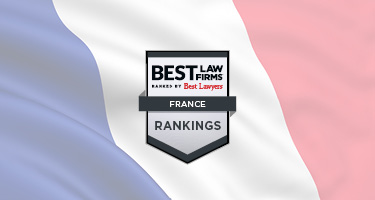Legal News, Insights and Thought Leadership
Lawyers, general counsel and industry visionaries reveal the trends, legislation and technology transforming the law.
Excellence in Practice: The 2026 edition of Best Law Firms®
by Jamilla Tabbara
Reflecting the firms that set the standard in legal skill and service in the United States.
AI’s War in the Courtroom: Copyright Disputes Spike in 2025
by David L. Brown
How clients can prepare, according to lawyers and industry experts.
Thought Leadership
View All Thought Leadership Insights
Will Personal Injury Firms Be Private Equity’s Next Target?
As PE investment accelerates, personal injury firms are primed for disruption.

Law Firm Office Mandates Help Drive Rental Leasing Boom
Surge doubles law firms' share of the commercial market.

Law Firms Avoid Cuts, But ROI Remains a Problem
Marketing budgets prioritized, but many firms struggling.

Early Lawsuits Highlight Risks to Companies Under the Bulk Data Tra...
How national security regulations are increasingly shaping privacy risk.

Making Florida Home: The Legal Realities of Domicile in 2025
How the laws that protect you can also just as easily constrain you.

When AI Listens Too Closely
The Otter.ai Lawsuit and the Future of Compliance

Law Firms’ Trump Deals Trigger DC Bar Ethics Alert
White House-linked agreements are drawing fresh scrutiny.

Pro Bono Hours Dropped at US Firms Last Year.
Don’t Expect Them to Bounce Back Soon.

Legal Job Market Anxiety Growing Amid AI and Economic Uncertainty
As law firm hiring transforms, legal professionals must adapt skills and rethink career strategies.

The Disconnect in Legal AI Is Real
Big expectations, no payoff?

Is AI Killing Lawyer Burnout—And Also Their Jobs?
Attorneys are finally less stressed thanks to AI. Is it a Pyrrhic victory?

Everyone Wants to Be a Lawyer Now—Blame the Economy (and Politics)
Highest-ever grad employment rate, activism propelling boom.

ABA Takes Aim at Trump Policies on Law Firms and Immigration
The nation’s largest voluntary bar shows it's serious about opposing White House policies it says threaten the rule of law.

DEI and Pro Bono Crumble as Trump Bulldozes Big Law
Is the White House's war on law firms hurting vulnerable defendants most?

Fake Legal Threats at Your Fingertips—What Could Possibly Go Wrong?
Tech disruption continues reinventing law as we know it.

EEOC Blasted for ‘Shakedown’ of Major Law Firms Over DEI Programs
Acting chief unleashed threat tactics and 'sham investigations,' say Democrats.
For Clients
View All Insights for Clients
AI’s War in the Courtroom: Copyright Disputes Spike in 2025
How clients can prepare, according to lawyers and industry experts.

Clients Want the AI Future Now. Are Firms Dragging Their Feet?
As firms inch into AI, clients are surging fullspeed ahead.

Law Firms See Robust Third-Quarter Growth
Client demand spiked to fourth-highest in past two decades.

Law Firms Embrace AFAs, But Clients Want More Flexibility
Alternative Fee Arrangements Are Widespread, But Firms Offer Limited Choices

The Legal AI Revolution Won’t Wait—Law Firms Are Lagging Behind
Lawyers are slow to adopt the technology, but experts say change is inevitable.

The Top Big Law Firms Shaping the Future
Amidst tech and political drama, summer associates grade the best

In-House Counsel Facing Stalled Salaries Amid Mounting Pay Battles
Corproate lawyers are feeling the squeeze with stagnant pay and strict licensing.

Clients Are Demanding AI and Savings—Can Law Firms Deliver?
Can the legal industry meet the AI and efficiency mandate?

In-House Leaders Reveal Client Service 'All-Star' List
What does it take to serve clients in 2025? Speed, creativity and a practical approach.

General Counsel Warn Apple Ruling Threatens Attorney-Client Privilege
Why the decision might set a dangerous precedent.

Law Firms Hold Their Own Amid Q2 Turmoil, Uncertain Economy
Steady growth and stable profits defined the 'unexpectedly prosperous' period.

AI Is Reshaping Legal Work—But Is It Stealing Lawyers' Jobs?
Are attorneys already being replaced?

Law Firms Fueling US Office Leasing Boom With Record Numbers
One market alone just saw the best renting activity in over a decade.

How Law Firms Respond to Executive Orders May Cost Them Clients
Microsoft, McDonald’s and More Are Dropping Cooperating Firms

German Firms Tighten Focus on Domestic Matters
Report: Most German Firms Pursuing Stay-at-Home Strategy

For Canadian Law Firms, US Trade War Means More Work—And Uncertainty
Turmoil Is Creating a Best-of-Times, Worst-of-Times Scenario for Law Firms.
Announcements
View All Announcement Insights
Excellence in Practice: The 2026 edition of Best Law Firms®
Reflecting the firms that set the standard in legal skill and service in the United States.

Spotlighting the 2026 Best Law Firms™ – Canada Rankings
Insights from the second edition of the Best Law Firms – Canada rankings.

Revealing the 2026 Best Law Firms™ – France Rankings
A first-ever look at firm-level excellence in France.

Presenting the 2026 Best Law Firms™ – Germany Rankings
The second edition of Best Law Firms – Germany provides a trusted benchmark for recognized firms.

Introducing the Inaugural Best Law Firms™ – Spain Rankings
Backed by data from clients, lawyers and firm leaders across the country.

Unveiling the 2026 Best Law Firms™ – Australia Rankings
Insights from our Client and Market Reports spotlight how firms lead in service and strategy.

The Value of the Best Law Firms Network
How Best Law Firms empowers firm-level success.

Leveraging Legal Networks for Small-to-Midsize Firms
Explore how your law firm can enhance visibility, gain referrals and strengthen its reputation.

Announcing Best Law Firms™ – France
Best Lawyers is expanding its European research with Best Law Firms – France, inviting firms to submit for evaluation in the inaugural ra...

Celebrating 15 Years of Best Law Firms®: A Trusted Benchmark in Leg...
Recognizing the leading law firms across the U.S. through a data-driven ranking process.

Research Now Underway for for Best Law Firms™ – Spain
Best Lawyers is expanding its European efforts with the upcoming launch of Best Law Firms – Spain, recognizing excellence in the legal pr...

Introducing Best Law Firms™- Germany: A New Standard for Legal Exce...
Explore Germany’s top 2% law firms recognized for excellence.

Best Law Firms™ Survey Insights: Germany’s First Edition
Best Law Firms surveyed Germany's top firms, revealing insights into their operations, pro bono work, and commitment to diversity, equity...

Announcing the First Edition of Best Law Firms™ Rankings in Australia
Best Lawyers is thrilled to announce the debut edition of Best Law Firms™ in Australia, a publication milestone for Australia and the glo...

Announcing Best Law Firms™ – Canada
Best Lawyers® is officially continuing its international expansion efforts of Best Law Firms™ with the announcement of the upcoming Best ...

Announcing Best Law Firms™ – Germany
Best Lawyers® is continuing its international expansion of Best Law Firms™ with the announcement of the upcoming Best Law Firms – Germany.

Announcing the Inaugural Edition of Best Law Firms™ - Australia
Best Lawyers® is excited to announce the official expansion of the esteemed Best Law Firms™ rankings into Australia with Best Law Firms -...

Best Law Firms® Research Explained
Best Law Firms® rankings are annually produced awards recognizing the top law firms across the United States. We are here to offer insigh...

The First Edition of Best Law Firms™ – Canada: Your Guide to the Na...
Celebrating Canada’s Best Law Firms: a trusted first edition resource for clients and legal professionals.


